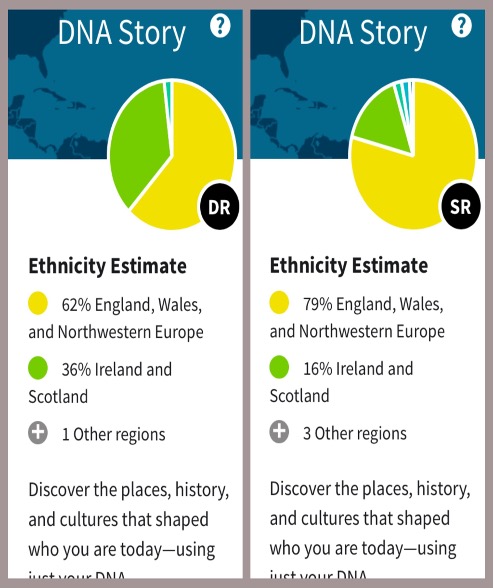What is an Ethnicity Estimate?
If you are looking to take a DNA test, or have taken one and need to understand the results, you will likely want to know what an ethnicity estimate is. In this article, we will cover what is it, how it is inherited, and how DNA tests can estimate your ethnicity.
Those looking to find their roots through genealogy are embarking on a voyage of discovery. You may have a very clearly defined sense of your culture and the results of your searches may bear out what you already know.
AncestryDNA is Our Top Recommendation
After reviewing all of the top DNA products on the market, nothing comes close to AncestryDNA to help you discover your whole family story!
They give you so much more than any other family tree DNA kit, and let you connect to the places you're from in the world where your family story started, and even help you to discover living relatives you never knew you had!
For the most accurate family history research based on your DNA, sign up for AncestryDNA now!
Get AncestryDNA →It is the surprises though that make searching for our origins the most exciting. If you are considering taking an AncestryDNA or 23andMe Ethnicity Estimation test you may be wondering what it’s all about and how it works.
How Is Our Ethnicity Inherited?
In order to understand how these tests work it is probably best to start off with just how our ethnicity is inherited. Well just like any aspect of our DNA the genes that hold the secret to where our ancestors came from are passed down through the generations.
We receive about 50% of our DNA from each of our parents who themselves got 50% from each of theirs. This means that in a perfect world we should have received 25% of our DNA from each of our four grandparents.
DNA recombination is not perfect, however, and it can be very random. Beyond the parent/child relationship DNA inheritance starts to waver. Below is a table that shows how much DNA we might receive from our ancestors if DNA inheritance was perfect.
| Relationship | Number of Ancestors | Expected % of Inherited DNA |
|---|---|---|
| 5x Grandparents | 128 | 0.78% |
| 4x Grandparents | 64 | 1.56% |
| 3x Grandparents | 32 | 3.12% |
| 2x Grandparents | 16 | 6.25% |
| Great Grandparents | 8 | 12.5% |
| Grandparents | 4 | 25% |
| Parents | 2 | 50% |
| You | ||
So how does this relate to our ethnicity estimate? Well, among the DNA that we inherit there are segments that are commonly found in the populations of specific regions. The more segments we have in common with the populations of a region, the higher the likelihood that we have ancestors from that place.
As an example, if one of our great-great-great-grandparents was of African heritage we could potentially share 3.12% of their DNA, more or less. In that DNA could be segments that are commonly found in Africa.
What Is an Ethnicity Estimate?
Ethnicity estimates which are sometimes known as ancestry composition reports are the most popular reason for consumer DNA testing. It is only one aspect of the test but for most people, it is the main reason they buy.
It is a breakdown report that provides a reasonably accurate approximation of a person's most recent global ancestry. Using a complex algorithm and the results from millions of DNA tests around the world, sites like AncestryDNA create an estimate of where your ancestors were living several generations ago.
Sites like AncestryDNA map out your DNA and look for segments that are common to the population of specific regions. The more segments you have that match a certain area the higher the percentage chance that you had a recent ancestor from that area.

Why Is It Called an Estimate?
It is important to remember that these sites do refer to their tests as estimates or approximations. As previously mentioned our DNA is not inherited in a perfect way. There may be ancestors in our tree from regions that do not show up in our ethnicity estimate.
We may have been told that our great-great-great-great-grandfather was 100% Native American, but there are no signs of that in the estimate. The truth is that we may not have inherited any DNA from that ancestor but without them, we would not exist.
Therefore it is possible that some of our family history is not reflected in our DNA at all. This is of course not the fault of the test or the testing companies. They can only find what is there after all and if the DNA was not passed down it can’t be found.
With regards to the DNA that is present, how accurate is the estimate? Well, it is important to note that if you and a full sibling both test you can get different results. You share the same parents so you would think your ethnicity would match. In truth, however, your sibling may possess the Native American DNA that is not found in yours.
The random recombination of DNA means that the further we go back in the generations the more inaccurate the percentage will likely be. If one of your parents is 100% Italian then you would be at least 50% Italian. If one of your grandparents was 100% Italian you would assume you would be at least 25%. In fact, your percentages might be lower or higher.
How Do Companies Do This?
The major testing companies such as AncestryDNA and 23andMe have spent years building a database of customers and DNA projects from around the world. Using complex techniques they have been able to profile unique DNA characteristics that are specific to certain regions.
It is against this extensive database that the big companies compare our DNA and use complex search algorithms to get our estimates. Based on how closely we match a certain region's known characteristics they assign a percentage based on that match.

Remember It’s Just for Fun
It is very important that we realize that these ethnicity DNA tests are 100% just for fun. Once we pay our $99 all we get is our ethnicity estimate and a whole bunch of potential DNA family matches. This is of course great and potentially helpful in our family tree building.
The test does not prove anything of great importance, however. It has no value in a paternity suit, it can't be used to determine dual citizenship and it has no value in proving ethnicity for any legal reason. These tests, although improving year by year in their accuracy, will never be 100% accurate because DNA itself is not fully accurate when it comes to our ethnicity.
Conclusion
Ethnicity estimates are a very unique and intriguing tool to help us understand a little bit about where we come from. It can help us focus our research or even question our preconceived ideas of who our ancestors were.
With a growing level of accuracy, the big testing companies are very successful at determining the regions that our DNA suggests our ancestors came from. However, there is still no way to reclaim ethnicity that was lost from our DNA.
This means that this test, while a great deal of fun, is no substitute for solid genealogical research. If we want to be sure that we know as much as possible about where our ancestors come from we still need to search the records and do the leg work.
Link To or Reference This Page
We spent a lot of time downloading, cleaning, merging, and formatting the data that is shown on the site.
If you found the data or information on this page useful in your research, please use the tool below to properly cite or reference Name Census as the source. We appreciate your support!
-
<a href="https://namecensus.com/blog/what-is-an-ethnicity-estimate/">What is an Ethnicity Estimate?</a>
-
"What is an Ethnicity Estimate?". NameCensus.com. Accessed on April 23, 2024. https://namecensus.com/blog/what-is-an-ethnicity-estimate/.
-
"What is an Ethnicity Estimate?". NameCensus.com, https://namecensus.com/blog/what-is-an-ethnicity-estimate/. Accessed 23 April, 2024
-
What is an Ethnicity Estimate?. NameCensus.com. Retrieved from https://namecensus.com/blog/what-is-an-ethnicity-estimate/.
